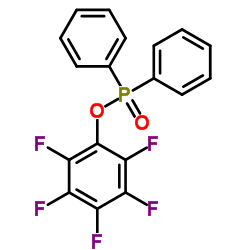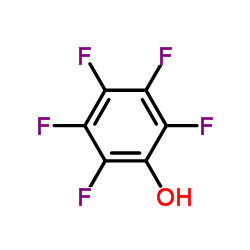138687-69-1
| Name | 1-diphenylphosphoryloxy-2,3,4,5,6-pentafluorobenzene |
|---|---|
| Synonyms |
Phosphinic acid, P,P-diphenyl-, 2,3,4,5,6-pentafluorophenyl ester
diphenyl-phosphinic acid pentafluorophenyl ester Pentafluorophenyl diphenylphosphinate Diphenylphosphinic acid pentafluorophenyl ester |
| Density | 1.5±0.1 g/cm3 |
|---|---|
| Boiling Point | 413.1±55.0 °C at 760 mmHg |
| Melting Point | 47-50ºC(lit.) |
| Molecular Formula | C18H10F5O2P |
| Molecular Weight | 384.237 |
| Flash Point | 203.6±31.5 °C |
| Exact Mass | 384.033844 |
| PSA | 36.11000 |
| LogP | 4.56 |
| Vapour Pressure | 0.0±0.9 mmHg at 25°C |
| Index of Refraction | 1.556 |
|
Section1. IDENTIFICATION OF THE SUBSTANCE/MIXTURE Product name: Pentafluorophenyl diphenylphosphinate Section2. HAZARDS IDENTIFICATION Classification of the substance or mixture Not a dangerous substance according to GHS. This substance is not classified as dangerous according to Directive 67/548/EEC.
Label elements
Caution - substance not yet tested completely. Other hazards - none Section3. COMPOSITION/INFORMATION ON INGREDIENTS Formula: C18H10F5O2P Molecular Weight: 384,24 g/mol CAS-No.EC-No.Index-No.ClassificationConcentration Pentafluorophenyl diphenylphosphinate 138687-69-1---- Section4. FIRST AID MEASURES If inhaled If breathed in, move person into fresh air. If not breathing, give artificial respiration. In case of skin contact Wash off with soap and plenty of water. In case of eye contact Flush eyes with water as a precaution. If swallowed Never give anything by mouth to an unconscious person. Rinse mouth with water. Section5. FIRE-FIGHTING MEASURES Suitable extinguishing media Use water spray, alcohol-resistant foam, dry chemical or carbon dioxide. Special protective equipment for fire-fighters Wear self contained breathing apparatus for fire fighting if necessary. Section6. ACCIDENTAL RELEASE MEASURES Personal precautions Avoid dust formation. Avoid breathing vapors, mist or gas. Environmental precautions Do not let product enter drains. Methods and materials for containment and cleaning up Sweep up and shovel. Keep in suitable, closed containers for disposal. Section7. HANDLING AND STORAGE Precautions for safe handling Provide appropriate exhaust ventilation at places where dust is formed. Normal measures for preventive fire protection. Conditions for safe storage Keep container tightly closed in a dry and well-ventilated place. Store in cool place. Section8. EXPOSURE CONTROLS/PERSONAL PROTECTION Personal protective equipment Respiratory protection Respiratory protection is not required. Where protection from nuisance levels of dusts are desired, use type N95 (US) or type P1 (EN 143) dust masks. Use respirators and components tested and approved under appropriate government standards such as NIOSH (US) or CEN (EU). Hand protection Handle with gloves. Gloves must be inspected prior to use. Use proper glove removal technique (without touching glove's outer surface) to avoid skin contact with this product. Dispose of contaminated gloves after use in accordance with applicable laws and good laboratory practices. Wash and dry hands. The selected protective gloves have to satisfy the specifications of EU Directive 89/686/EEC and the standard EN 374 derived from it. Eye protection Use equipment for eye protection tested and approved under appropriate government standards such as NIOSH (US) or EN 166(EU). Skin and body protection Choose body protection in relation to its type, to the concentration and amount of dangerous substances, and to the specific work-place., The type of protective equipment must be selected according to the concentration and amount of the dangerous substance at the specific workplace. Hygiene measures General industrial hygiene practice. Section9. PHYSICAL AND CHEMICAL PROPERTIES Appearance Formsolid Safety data pH no data available Melting point47 - 50 °C - lit. Boiling pointno data available Flash pointno data available Ignition temperatureno data available Lower explosion limitno data available Upper explosion limitno data available Water solubilityno data available Section10. STABILITY AND REACTIVITY Chemical stability Stable under recommended storage conditions. Conditions to avoid no data available Materials to avoid Strong oxidizing agents Hazardous decomposition products Hazardous decomposition products formed under fire conditions. - Carbon oxides, Hydrogen fluoride Section11. TOXICOLOGICAL INFORMATION Acute toxicity no data available Skin corrosion/irritation no data available Serious eye damage/eye irritation no data available Respiratory or skin sensitization no data available Germ cell mutagenicity no data available Carcinogenicity IARC: No component of this product present at levels greater than or equal to 0.1% is identified as probable, possible or confirmed human carcinogen by IARC. Reproductive toxicity no data available Specific target organ toxicity - single exposure no data available Specific target organ toxicity - repeated exposure no data available Aspiration hazard no data available Potential health effects InhalationMay be harmful if inhaled. May cause respiratory tract irritation. IngestionMay be harmful if swallowed. SkinMay be harmful if absorbed through skin. May cause skin irritation. EyesMay cause eye irritation. Additional Information RTECS: no data available Section12. ECOLOGICAL INFORMATION Toxicity no data available Persistence and degradability no data available Bioaccumulative potential no data available Mobility in soil no data available PBT and vPvB assessment no data available Other adverse effects no data available Section13. DISPOSAL CONSIDERATIONS Product Offer surplus and non-recyclable solutions to a licensed disposal company. Contaminated packaging Dispose of as unused product. Section14. TRANSPORT INFORMATION ADR/RID Not dangerous goods IMDG Not dangerous goods IATA Not dangerous goods SECTION 15 - REGULATORY INFORMATION N/A SECTION 16 - ADDITIONAL INFORMATION N/A |
| Personal Protective Equipment | Eyeshields;Gloves;type N95 (US);type P1 (EN143) respirator filter |
|---|---|
| Safety Phrases | 24/25 |
| RIDADR | NONH for all modes of transport |
| WGK Germany | 3 |
| HS Code | 29319090 |
|
~97% 
138687-69-1 |
| Literature: Chen, Shaoqing; Xu, Jiecheng Tetrahedron Letters, 1991 , vol. 32, # 46 p. 6711 - 6714 |



